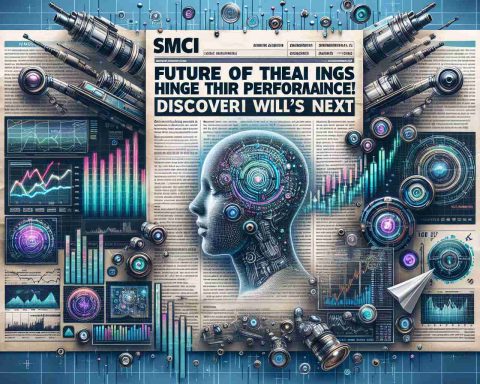The Rise of Quantum Computing
Investors are buzzing about the future of quantum computing, a technology that promises to revolutionize data processing. Unlike traditional computers that rely on binary bits, quantum computers utilize qubits, which can exist in multiple states simultaneously. This groundbreaking feature could lead to significantly faster computations, leaving conventional systems in the dust.
However, a major challenge remains: stability. As more qubits are added, the likelihood of errors increases substantially. Most experts agree that achieving reliable quantum computing is still a few years away from practical application.
Fortunately, Alphabet, the parent company of Google, has made a pivotal breakthrough with its innovative quantum chip known as Willow. This chip stands out because it minimizes error rates as qubit numbers rise, unlike its predecessors. In a remarkable demonstration, Willow completed a standard benchmark calculation in just five minutes—an astonishing feat compared to existing supercomputers that would take an unfathomable timeframe.
With commercial adoption still on the horizon, Alphabet’s solid revenue streams from digital advertising and cloud services provide substantial backing for its quantum endeavors. The company boasts impressive liquidity and free cash flow, allowing it to invest heavily in its quantum computing research.
For investors eyeing the quantum realm, Alphabet presents an enticing opportunity, particularly as it offers the most attractive valuation among industry peers. As 2025 approaches, the combination of Willow’s capabilities and Alphabet’s financial strength could place it at the forefront of quantum computing.
Broader Implications of Quantum Computing
The impending era of quantum computing holds profound implications for society and the global economy. This technology’s ability to solve problems exponentially faster than classical computers could reshape industries from pharmaceuticals to finance. For instance, quantum computing could expedite drug discovery, potentially leading to more effective treatments and a reshaping of healthcare systems. Similarly, in financial markets, it could optimize trading algorithms, enhancing market efficiency and possibly resulting in significant shifts in global power dynamics.
As quantum technology advances, cultural shifts may also arise. The public’s understanding and acceptance of such complex technologies could lead to a society more attuned to scientific literacy and innovation. However, this also raises ethical considerations concerning access disparities and the potential for misuse in areas like cryptography and cybersecurity.
On an environmental level, quantum computing could facilitate breakthroughs in energy efficiency, offering solutions for tackling climate change. Its capacity to model complex systems might accelerate developments in renewable energy sources and improve resource management, offering a path towards sustainability.
Looking ahead, future trends indicate a growing emphasis on collaboration among tech giants and startups, spurring innovation. The long-term significance of quantum computing extends beyond mere computational capabilities; it could redefine societal norms, environmental strategies, and economic structures, ultimately altering the fabric of daily life on a global scale.
The Future of Quantum Computing: Insights and Innovations on the Horizon
Understanding Quantum Computing
Quantum computing represents a significant leap forward in technology, harnessing the principles of quantum mechanics to process data in ways that traditional computers cannot. Through the use of qubits—quantum bits that can exist in multiple states simultaneously—quantum computers have the potential to perform complex calculations at unprecedented speeds, vastly outperforming their classical counterparts. This capability has implications across various fields, including cryptography, artificial intelligence, and materials science.
Key Features and Innovations
1. Qubit Stability and Error Correction: One of the primary challenges in quantum computing is maintaining qubit stability to minimize errors. New advancements in error correction techniques and hardware design may enhance reliability and allow for more stable qubit environments, paving the way for practical applications in the near future.
2. Quantum Supremacy: Achieving quantum supremacy—where a quantum computer performs a calculation that classical computers cannot replicate in a reasonable timeframe—has been a landmark goal for researchers. Google’s Willow chip’s successful benchmark calculation may contribute to defining quantum supremacy in tangible terms.
3. Hybrid Quantum-Classical Systems: The integration of quantum computing capabilities with traditional computing systems may provide a pathway to immediate applications. This hybrid approach allows businesses to leverage quantum power for specific tasks while relying on classical computing for others, optimizing workflows and maximizing efficiency.
Pros and Cons of Quantum Computing
– Pros:
– Speed: Quantum computers can perform calculations at much higher speeds than classical computers.
– Complex Problem Solving: They can tackle problems that are currently unsolvable, opening new avenues in research and technology.
– Drug and Material Discovery: Quantum computing could revolutionize fields such as pharmaceuticals and materials science by simulating molecular interactions.
– Cons:
– Complexity and Costs: Building and maintaining quantum computers is resource-intensive and complex.
– Error Rates: High error rates due to environmental factors make practical quantum computing challenging.
– Limited Current Applications: Many potential applications are still theoretical, with few practical uses available.
Market Insights and Business Implications
The quantum computing market is poised for substantial growth. According to recent industry reports, the global quantum computing market is expected to reach $65 billion by 2030, driven by increased investment in research and development. Major players in the field, including Google, IBM, and Microsoft, are competing to lead the market, each developing proprietary technologies and partnerships.
Security Aspects and Implications for Cryptography
As quantum computing advances, its impact on cybersecurity cannot be overlooked. Quantum computers could potentially undermine current encryption standards, leading to vulnerabilities in data security. This has prompted research into post-quantum cryptography to protect sensitive information against future quantum threats. Organizations are urged to implement security measures that anticipate these changes now.
Sustainability and Future Predictions
The energy consumption and environmental impact of technologies are becoming increasingly critical. Quantum computing, when fully realized, has the potential to optimize global systems—such as energy grids and logistics—ultimately leading to more sustainable practices. By harnessing the power of quantum computation, industries could innovate solutions that significantly reduce waste and carbon footprints.
Conclusion
With Alphabet’s Willow chip making headlines for its capabilities, the future of quantum computing looks promising. As stability and error correction improve, and as companies continue to invest heavily in this technology, significant advancements can be anticipated in the coming years. For businesses and investors, remaining informed on these trends will be crucial to navigate the evolving landscape of quantum computing.
For additional insights into the world of technology and innovation, visit Alphabet.




















